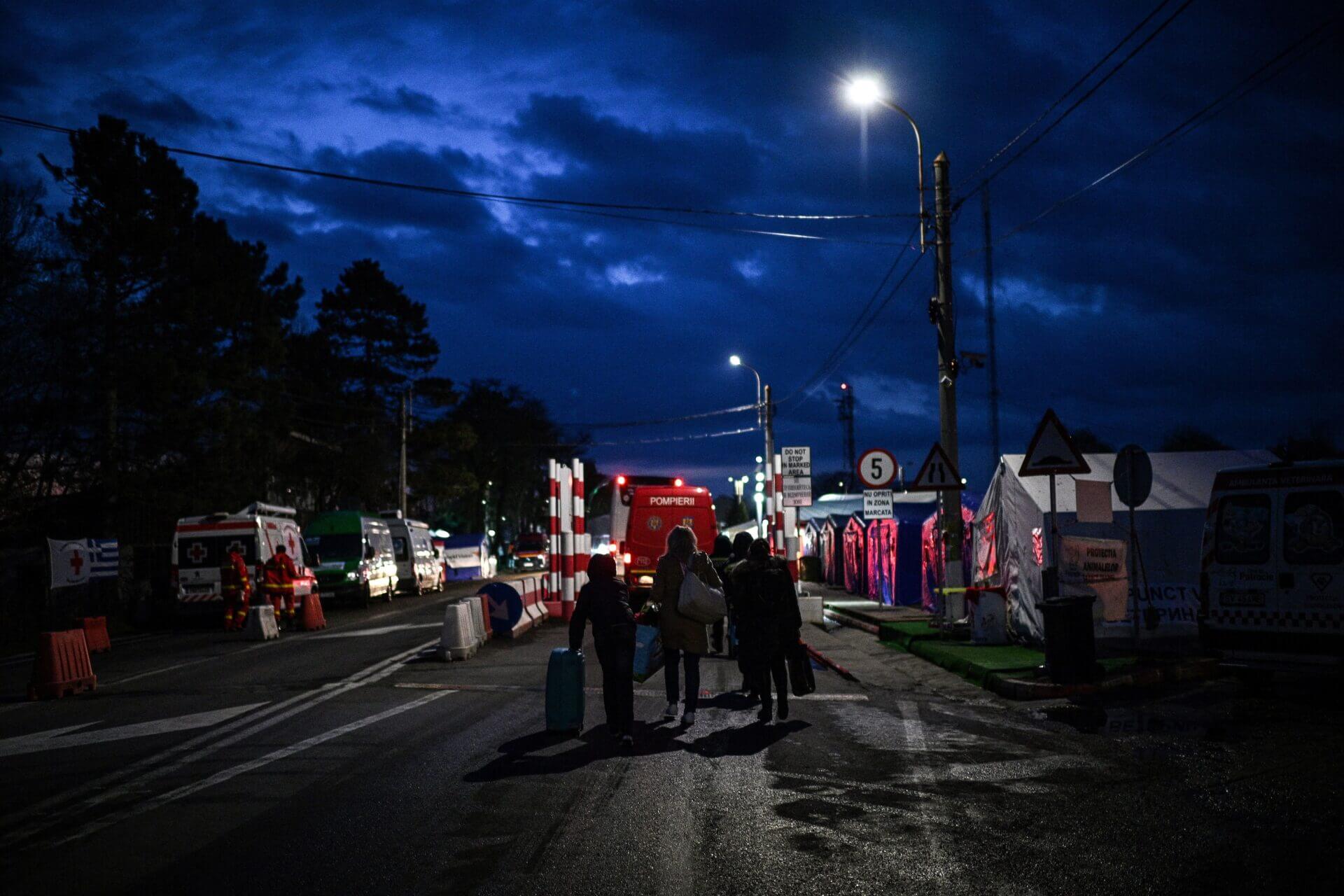Solving the Puzzle of Ukraine
Kamila Fomin stood at the Romania-Ukraine border and burst into tears.
“I wasn’t able to stop crying,” she said.
The 18-year-old USC international relations major and Ukrainian citizen saw Romanian flags fluttering on one side and Ukrainian flags on the other. She could see the Carpathian Mountains, where she and her friends had camped over the summers.
At the Sighet crossing in Romania, she watched Ukrainians with young children lug huge bags across the border to safety. Her mind flashed back to late February 2022, when her panicked parents and two sisters had fled the nearby city of Ivano-Frankivsk as Russian missiles exploded all around them, eventually making their way to this very crossing.
Fomin’s father, unable to join the rest of the family as Ukrainian men under 60 were required to remain in the country, dropped his wife and daughters off at the border and said his goodbyes. It took her mother and sisters seven hours to cross into Romania. They had no water or food with them.
Now, seven months later, Fomin was in Sighet with 19 other USC students as part of a yearlong course called Innovation in Engineering Design for Global Crises. Offered through USC Viterbi, the course, CE 486, teaches students to identify problems faced by displaced, dispossessed or under-resourced people, with the goal of finding engineering solutions to help them. This year’s class focuses on the millions of Ukrainian refugees fleeing to Romania and elsewhere, as well as the Ukrainians staying behind who have suffered greatly during the war.
Concerned for his distressed student, instructor Daniel Druhora approached Fomin. Moments later, a Romanian border guard appeared, asking them if everything was OK. After learning Fomin’s story, the guard, himself married to a Ukrainian woman, asked if they would like to cross the bridge over the Tysa River into Ukraine. A few minutes later, they did.
Fomin immediately felt like she had come home. “I was a completely different person in Ukraine,” said Fomin, who at 15 moved to Chicago attend a private high school on scholarship and left behind a Ukraine increasingly destabilized by Russia, even before the latest hostilities. “To me, there’s just Ukraine and the whole world around it.”
Returning to Romania, Fomin’s short-lived joy quickly dissipated. Why am I in the United States and going to USC while my so many of my compatriots struggle just to survive? she wondered. What can I do to help?
Fomin vowed to channel that emotion into something positive.
She later co-founded Raise a Glass, a burgeoning USC student-led startup in CE 486 that hopes to partner with small to midsize Eastern European wineries to create special-edition wines that incorporate augmented reality and storytelling to support Ukrainians devasted by war.
“I have to do this. I have to do a good job,” Fomin said. “I feel extra responsibility to help in the best possible way, to be as effective as possible.”
Lives, Not Grades
The course — offered through the Sonny Astani Department of Civil and Environmental Engineering — brings together graduate and undergraduate students from a variety of disciplines and sends them around the world to design and engineer solutions to global crises in chaotic environments. Over the course of two semesters, students learn about design thinking, prototyping, storytelling, the lean-startup methodology, identifying potential customers’ wants and needs, and presenting to investors. They also receive up to $5,000 per team for customer discovery and product development.
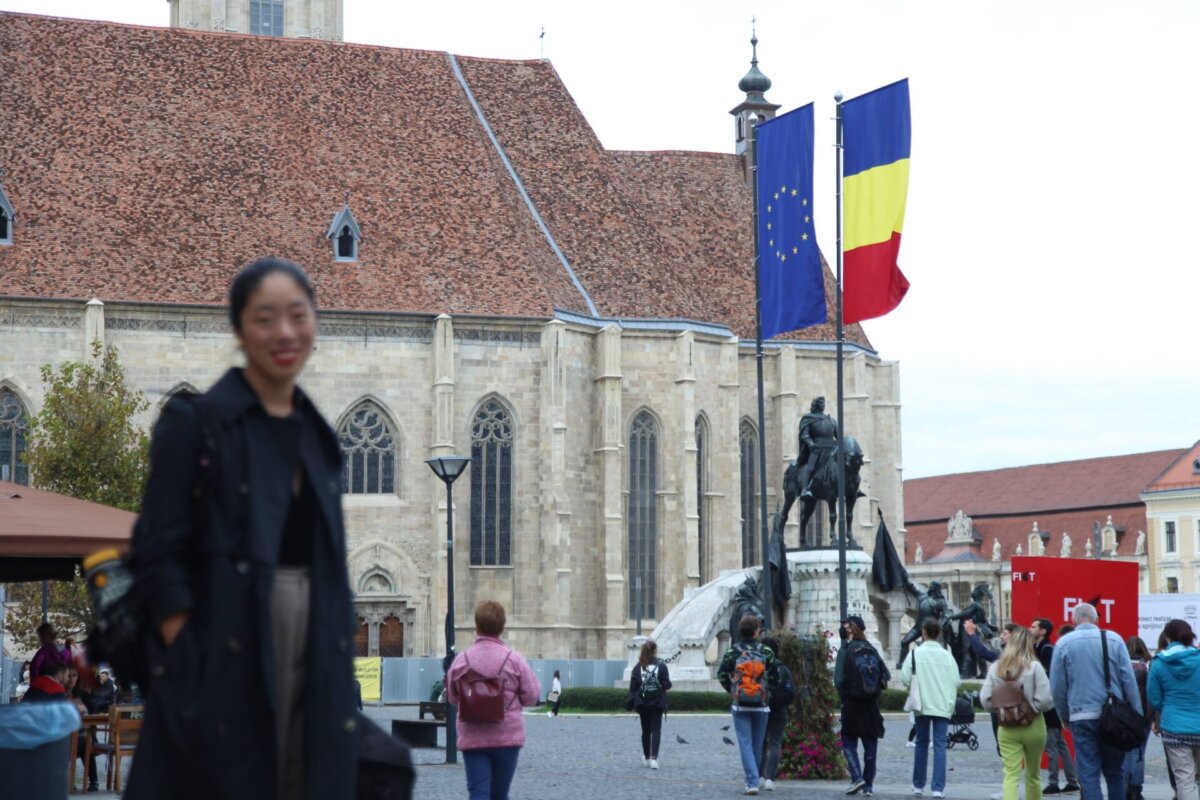
Several viable startups have come out of CE 486, including Duet, a micro-philanthropy platform that pairs donors with refugees and others in need. “This is about making an impact, trying to do some good in the world,” said Brad Cracchiola, a USC Viterbi lecturer in product development who co-founded the course with Druhora, David Gerber, associate professor of practice in civil and environmental engineering and architecture, and Burçin Becerik-Gerber, chair of the Sonny Astani Department. He also coined the class nickname, “Lives, Not Grades.”
The course, which recently became the capstone project for the new Innovation for Global Crises minor, launched in 2018.
Helping Ukrainians
From 2018 to 2020, CE 486 focused on the global refugee crisis. USC students visited Moria on the Greek island of Lesvos — at the time Europe’s largest refugee camp — to come up with ways to improve the refugees’ lives. “Lives, Not Grades,” a documentary directed by Druhora about the experiences of the 2018–2019 group of students, won an Emmy for best independent film at the 74th Annual Los Angeles Area Emmy Awards.
In the 2020–2021 academic year, the course focused on problems faced by Los Angeles’ poor during the COVID-19 pandemic. The following year, participants visited some of Alaska’s most remote regions to address sustainability issues faced by indigenous people.
Now, Lives, Not Grades is tackling one of its greatest challenges: the war in Ukraine and its regional and global ramifications.
“You could try to help people inside Ukraine,” Druhora said. “You could try to help people outside Ukraine in Romania, Poland or elsewhere. You could try to help NGOs on the frontlines. You could even help the Russians who are fleeing. There are so many layers. We didn’t see that with previous cohorts.”
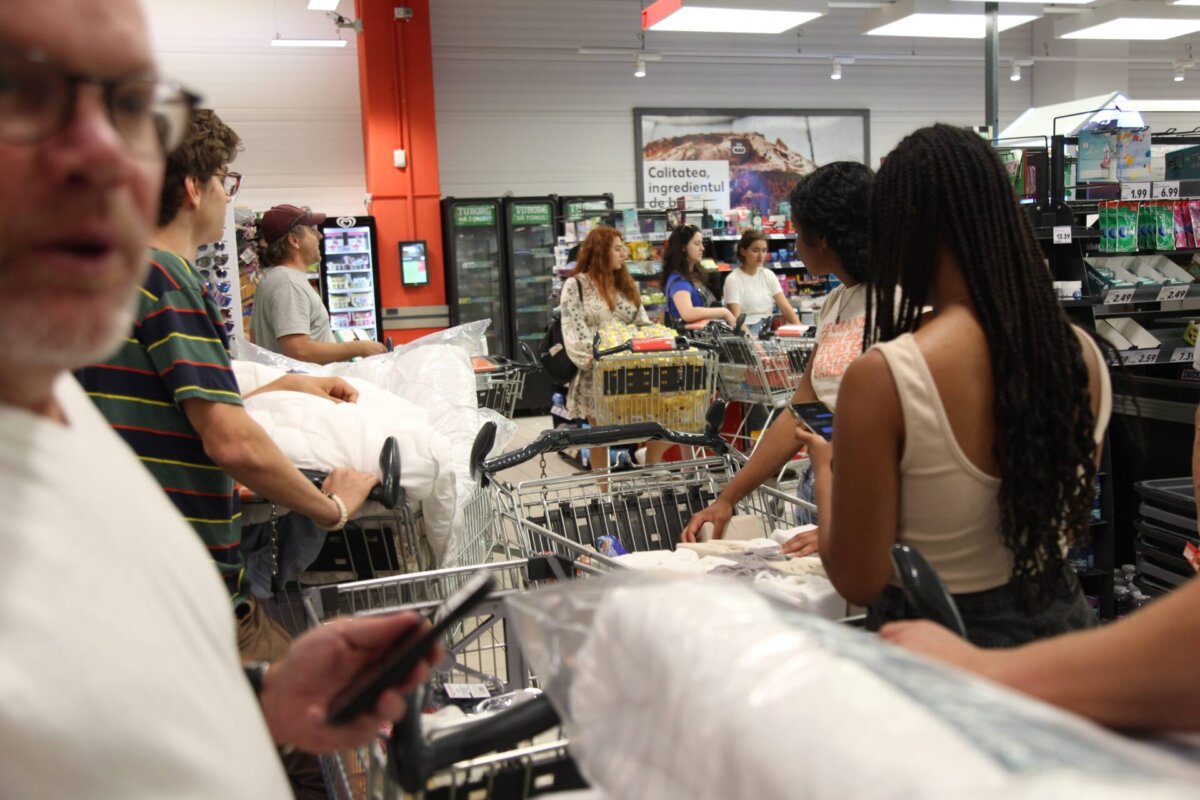
Russia launched an unprovoked, full-scale invasion of Ukraine in February 2022 to restore its economic and political sphere of influence and to topple the government. Russian President Vladimir Putin has called the largest military attack in Europe since World War II a “special military operation.”
To date, Russia has killed an estimated 40,000 Ukrainian civilians and killed or injured 100,000 Ukrainian soldiers, according to a November estimate by Gen. Mark Milley, chairman of the U.S. Joint Chiefs of Staff. Russian aggression has forced more 8 million Ukrainians to flee abroad and internally displaced 5.9 million people, according to the most recent statistics from the United Nations High Commissioner for Refugees. The World Bank said Ukraine has experienced a tenfold increase in poverty since the beginning of
the war.
The hardships faced by Ukrainians and the possibility of alleviating their suffering, even in some small way, have inspired many of the Lives, Not Grades students. Among them is Misha Kuznetsov, a 22-year-old senior majoring in mechanical engineering. Born in Ukraine and raised in Iowa, Kuznetsov said he feels especially motivated.
“It’s really a lot of work, but it’s enjoyable at the same time because you’re working toward something that is potentially going to make a difference,” said Kuznetsov, a member of Raise a Glass with Fomin, Nicholas Conner and Olivia Glick, both MBA students at the USC Marshall School of Business, and Mellissa Zhang, a junior majoring in computer science and business administration.
The teams
The Lives, Not Grades teams presented their preliminary ideas on Dec. 12, about halfway through the course, at Tommy’s Place on the USC campus. Among those in attendance were leaders in the Ukrainian community, tech entrepreneurs and founders of social innovation NGOs in Los Angeles.
Each team offered a unique take on how they might help:
Raise a Glass hopes to raise empathy and support for Ukraine through the power of storytelling and a glass of wine. Through Raise a Glass’s customized blue-and-yellow label, customers can scan to watch augmented reality stories of Ukrainian resistance, such as the Ukrainian grandmother who brought down a Russian drone by throwing a jar of tomatoes at it from her balcony. The startup plans to partner with a Ukrainian and/or Eastern European winery that would produce and bottle the wine, and initially target the American market. Bottles would sell for $15 to $20 apiece, with a percentage of the proceeds supporting Ukrainian nonprofit organizations.
Ember is developing an inexpensive, low-cost, super warm blanket that would keep Ukrainians warm during the brutal winter.
Allocare would create a donation platform that divides gifts evenly between current issues in the media, such as the Ukrainian crisis, and “forgotten” causes that have experienced a decline in financial support, such as the Black Lives Matter movement. Allocate wants to partner with small NGOs that work with people affected by crises.
Unlike the other presenters, Frontida Records is a flourishing startup. It provides an electronic records solution that organizes medical information in resource-stripped settings across the globe. Frontida has already served thousands of patients in more than 10 countries and is now building an app for a Ukrainian psychologist looking to treat survivors suffering from post-traumatic stress disorder using their platform.
The teachers
Each Lives, Not Grades instructor makes their own unique contribution. Cracchiola, who led the team credited with building the world’s fastest racing wheelchair at the 2016 Paralympic Games in Rio de Janeiro, brings expertise in engineering and product development. “I know how things are made, and I know how to make things,” he said.
Gerber holds a doctorate in design from Harvard University. He has co-founded, advised or served as an executive at several technology startups since 2006, including Gehry Technologies, an architect software and services business started by iconic architect Frank Gehry. In addition to teaching about design and how to efficiently launch a new business, Gerber conveys the importance of accepting and learning from major setbacks.
“I tell them that they’re not only allowed to fail but even encouraged to fail. Entrepreneurship is about risk taking and resilience,” he said. “Prototyping is iterative. Design is iterative. Learning how to ask questions and talk to potential customers is iterative. The entire process is frustrating and never-ending.”
Druhora, a 2014 graduate of the USC School of Cinematic Arts and an award-winning filmmaker, organizes the field missions, networks with the government and nonprofit officials who partner with students, and teaches immersive storytelling for engineers, innovators and makers.
But he does so much more than that.
Growing up in a communist dictatorship, Druhora, like the refugees and others CE 486 aims to help, knows what it’s like to feel marginalized. Druhora was born in 1982 during one of the most repressive periods in Romania’s history. His grandfather had been imprisoned years earlier as an enemy of the state. The secret police systematically harassed and even beat his father for his activities as an evangelical minister. The Druhoras immigrated to the United States in the early 1990s after the fall of the late Romanian President Nicolae Ceaucescu.
Druhora said his personal odyssey and faith have given him the motivation to help those in need. “Faith is an integral part of my identity,” he said. “It is not the only reason I do what I do, but it is a guiding light that influences my sense of justice in the world,” he said.
Coming to Romania
On Sept. 13, 20 USC students landed in Bucharest, Romania’s capital. After spending the night at a budget hotel, they began a 10-day journey that took them across the country and changed their lives.
Other than Poland, no country has accepted more Ukrainian refugees than Romania. More than one million Ukrainians have transited Romania since the beginning of the war, according to some estimates. Most have temporarily resided with Romanian families for a few weeks and returned home when conditions improved. Others remain, hoping to rebuild their lives.
The USC students met with Ukrainian refugees who shared their heartbreaking stories of loss as well as their wants and needs. They visited border crossings in the city of Tulcea on the Danube Delta and in Sighet.
In northwestern Romania, they went to Cluj-Napoca, known as the Silicon Valley of Eastern Europe. There, they spoke with business leaders and Ukrainian women entrepreneurs launching social entrepreneurship ventures.
In Bucharest, the USC group met with Sebastian Burduja, Romania’s minister of innovation, digitalization and research, and with Gheorghe Cârciu, head of the Romanian Ministry for the Diaspora, which assists ethnic Romanians inside Ukraine. They also participated in a Grand Challenges Scholars Summit with young Romanian entrepreneurs, academics and business leaders at the Polytechnic University in Bucharest to figure out how best to respond to the regional crisis. They received advice from serial tech entrepreneurs like Andrei Pitis, founder of VectorWatch and Fitbit’s former vice president of product, venture capitalists and entrepreneurs, all of whom had mobilized to help with relief efforts.
At one point, the USC cohort went to a supermarket in Tulcea and bought rice, flour, oil, canned vegetables, soap, diapers and other staples. They packed the food into a van belonging to a volunteer who delivered it the following day to the besieged residents of Kharkiv in Ukraine.
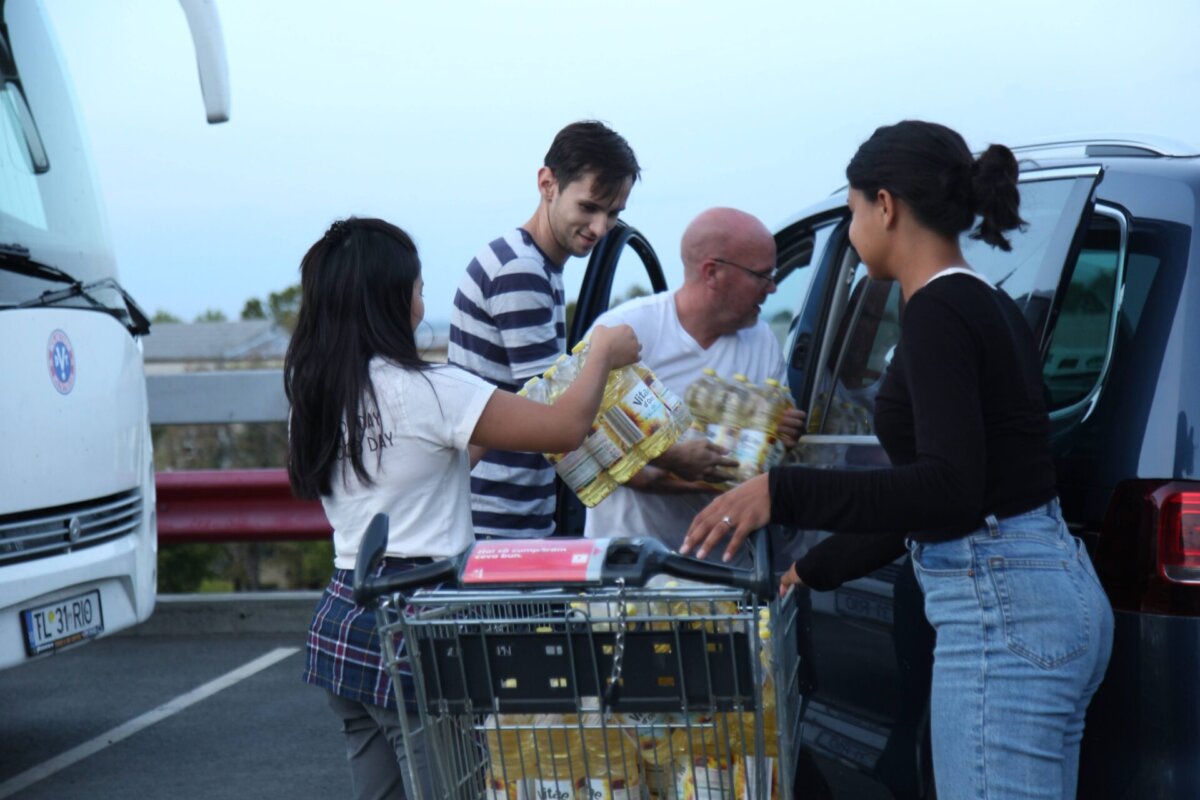
All the while, the would-be innovators thought about mobile apps and products they could develop in response to the war in Ukraine.
Julia Petrallo, a senior business major at USC Marshall, said conversations with several Ukrainian refugees in Romania led her and her Ember teammates to focus on finding ways to keep Ukrainians warm during their brutal winter, a goal more urgent than ever as Russia is intentionally destroying the country’s energy infrastructure. After considering several ideas, they eventually settled on developing a low-cost, super warm blanket.
Compassion, empathy and the future
The Lives, Not Grades participants did more than just hone their business skills and refine their ideas during their stay in Romania, said teaching assistant Zoia Comarova, a second-year USC Viterbi Ph.D. student in resource management and energy efficiency. They developed a sensitivity and sensibility they might have previously lacked.
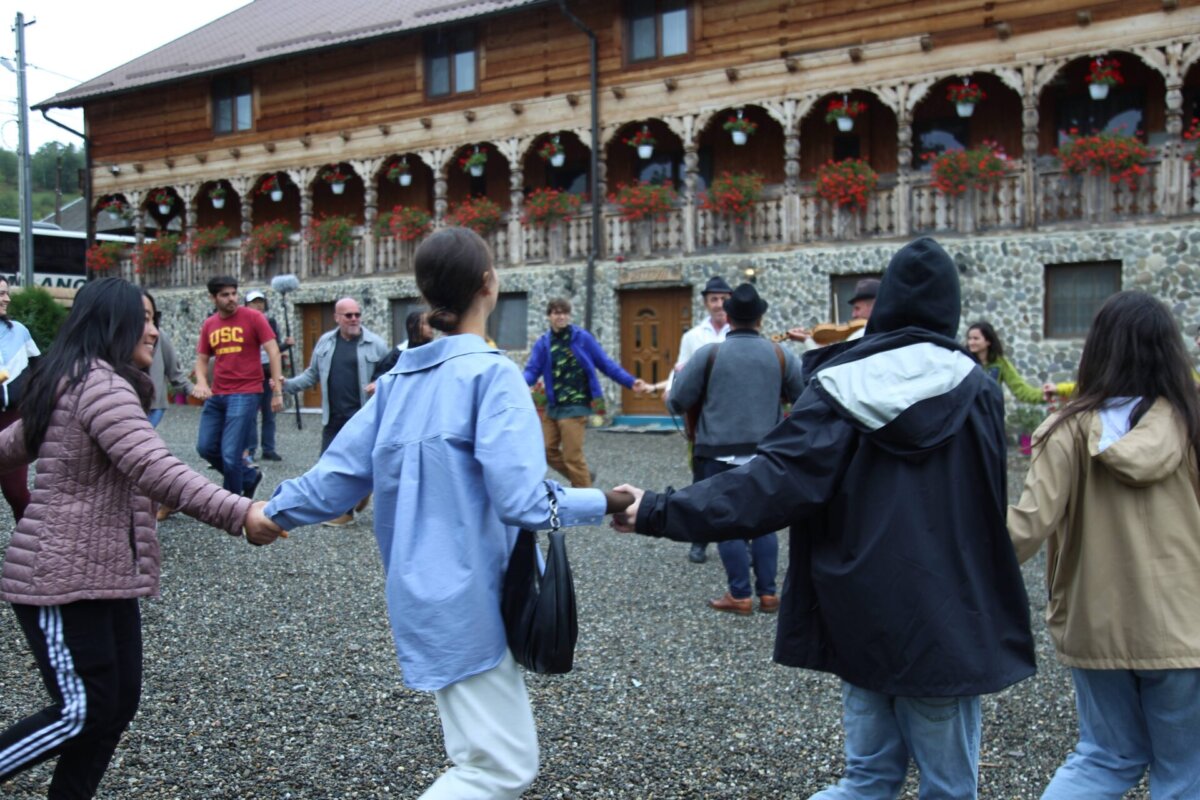
“I think this is one of the most impactful experiences they might have had in their lives. They’ve become more compassionate and empathetic,” said Comarova, a Moldovan national who acted as a translator, among other duties. “A lot of them had breakthrough moments during the trip.”
This spring, the Lives, Not Grades students continued to work on their prototypes, collaborating with refugees and organizations in Ukraine, Romania and Moldova as well as in Los Angeles. In May, they plan to present their products to a panel of industry judges and potential partners in hopes of taking their solutions to the next level.
Beyond building functional prototypes, the course has transformed them.
“This class has improved my entrepreneurship skills, my pitching, my problem-solving, my project management and my ability to address the challenges that we see in the world,” said Emily Briscoe, a junior majoring in environmental engineering and a member of Ember. “I’ve always wanted to make a difference. That’s why I wanted to become an engineer. Now, I’ve refined and developed tangible skills to actually make a positive change.”




